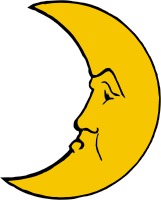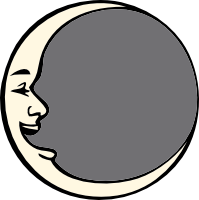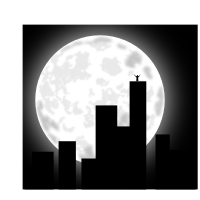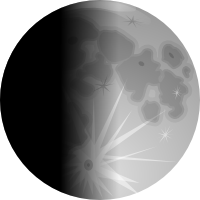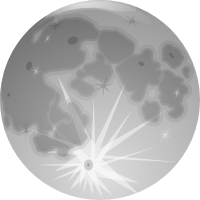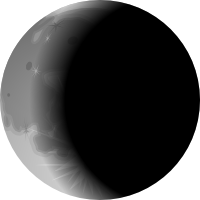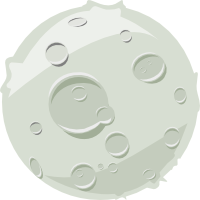Associations to the word «Moon»
Noun
- Basalt
- Kepler
- Astrology
- Hyperion
- Equator
- Moon
- Splendour
- Meteor
- Star
- Gravity
- Blocking
- Glow
- Sunset
- Rocket
- Landing
- Hoax
- Gemini
- Celestial
- Constellation
- Calendar
- Probe
- Howl
- Sung
- Twilight
- Floyd
- Perturbation
- Shadow
- Howling
- Diameter
- Watcher
- Soo
- Jan
- Roger
- Surface
- Eccentricity
- Bulge
- Crust
- Astronomy
- Midnight
- Hemisphere
- Satellite
- Whiteness
- Halo
- Trajectory
- Almanac
- Buzz
- Splendor
- Mare
- Quake
- Gleam
- Vapour
- Horus
- Darkness
- Blackness
- Mist
- Osiris
- Illumination
- Pale
- Silhouette
- Priestess
- Light
- Robotic
- Haze
- Brilliance
- Armstrong
- Girl
- Nebula
Adjective
Pictures for the word «Moon»
Wiktionary
MOON, noun. The largest satellite of Earth.
MOON, noun. Any natural satellite of a planet.
MOON, noun. (literary) A month, particularly a lunar month.
MOON, noun. A crescent-like outwork in a fortification.
MOON, verb. (transitive) (colloquial) To display one's buttocks to, typically as a jest, insult, or protest.
MOON, verb. (intransitive) (colloquial) (usually followed by over or after) To fuss over something adoringly; to be infatuated with someone.
MOON, verb. To spend time idly, absent-mindedly.
MOON, verb. (transitive) To expose to the rays of the Moon.
MOON, proper noun. The Earth's moon; the sole natural satellite of the Earth, represented in astronomy and astrology by ☾.
MOON, proper noun. (paganism) The god of the Moon in Heathenry.
MOON, proper noun. A surname.
MOON BAG, noun. A small pouch attached to a belt that is worn on the outside of clothing around the waist and used for holding small personal items.
MOON BAGS, noun. Plural of moon bag
MOON BEAR, noun. The Asian black bear, Ursus thibetanus.
MOON BEARS, noun. Plural of moon bear
MOON BLINDNESS, noun. A chronic equine inflammatory eye disease.
MOON BLINDNESS, noun. The optic condition night blindess: reduced eyesight in faint light.
MOON BOOT, noun. A type of footwear made popular in the 1970s, with a thin rubber outsole and no distinct left or right feet.
MOON BOOT, noun. (AU) (informal) A large hard plastic covering, used to protect a broken foot or ankle while it heals.
MOON BOOTS, noun. Plural of moon boot
MOON BOUNCE, noun. (US) bounce house.
MOON BOUNCES, noun. Plural of moon bounce
MOON CAKE, noun. Alternative spelling of mooncake
MOON CRICKET, noun. (racial slur) A black person.
MOON GOD, noun. (US) (highly offensive) (slur) Allah.
MOON GUITAR, noun. (music) Alternative term for yueqin
MOON GUITARS, noun. Plural of moon guitar
MOON ILLUSION, noun. The optical illusion whereby the moon looks larger when it is low in the sky than otherwise.
MOON JELLIES, noun. Plural of moon jelly
MOON JELLY, noun. A globally common jellyfish of the genus Aurelia, especially Aurelia aurita. [from 20th c.]
MOON LANDING, noun. The safe arrival of a spacecraft on the surface of the moon
MOON LANDINGS, noun. Plural of moon landing
MOON LANGUAGE, noun. (slang) Text written in an incomprehensible script, especially Japanese or Chinese.
MOON LANGUAGES, noun. Plural of moon language
MOON LETTER, noun. (linguistics) One of fourteen Arabic letters that do not affect the pronunciation of the "L" of a preceding definite article (ال-). The "L" in the Arabic definite article is pronounced "L" when followed by a moon letter: e.g., القُرْآن. The fourteen moon letters are:
MOON LETTERS, noun. Plural of moon letter
MOON ON A STICK, noun. (idiomatic) Everything; all that one could desire (especially as an unreasonable demand).
MOON RAT, noun. Alternative spelling of moonrat
MOON RATS, noun. Plural of moon rat
MOON ROCK, noun. A rock from the surface of the moon, but especially any geological specimen brought back by the Apollo program
MOON ROCKET, noun. A ground-launched rocket-propelled vehicle that delivers a payload to orbit or land on the moon
MOON ROCKET, noun. (finance) A company whose stock price rises dramatically following an initial public offering
MOON ROCKETS, noun. Plural of moon rocket
MOON ROOF, noun. Alternative spelling of moonroof
MOON ROOFS, noun. Plural of moon roof
MOON RUNE, adjective. (Of writing) obscure, incomprehensible.
MOON RUNE, noun. (science fiction and fantasy) A runestone or similar object associated with the moon.
MOON RUNE, noun. (science fiction and fantasy) A rune or other writing indicating or associated with the moon.
MOON RUNE, noun. (slang) (derogatory) An incomprehensible writing script; frequently Chinese characters, hiragana, katakana or other East Asian script.
MOON SHOT, noun. The launching of a spacecraft or an object to orbit or land on the Moon
MOON SHOT, noun. Throwing or hitting a ball with a high trajectory
MOON SHOT, noun. (figuratively) an expensive or hard task of great potential impact
MOON SHOTS, noun. Plural of moon shot
MOON SNAIL, noun. Any of the family Naticidae of predatory sea snails.
MOON SNAILS, noun. Plural of moon snail
MOON TREFOIL, noun. Medicago arborea, a plant with yellow flowers.
MOON UNIT, noun. (slang) A stupid person; an idiot.
MOON UNITS, noun. Plural of moon unit
MOON ZITHER, noun. (music) Alternative term for yueqin
MOON ZITHERS, noun. Plural of moon zither
Dictionary definition
MOON, noun. The natural satellite of the Earth; "the average distance to the Moon is 384,400 kilometers"; "men first stepped on the moon in 1969".
MOON, noun. Any object resembling a moon; "he made a moon lamp that he used as a night light"; "the clock had a moon that showed various phases".
MOON, noun. The period between successive new moons (29.531 days).
MOON, noun. The light of the Moon; "moonlight is the smuggler's enemy"; "the Moon was bright enough to read by".
MOON, noun. United States religious leader (born in Korea) who founded the Unification Church in 1954; was found guilty of conspiracy to evade taxes (born in 1920).
MOON, noun. Any natural satellite of a planet; "Jupiter has sixteen moons".
MOON, verb. Have dreamlike musings or fantasies while awake; "She looked out the window, daydreaming".
MOON, verb. Be idle in a listless or dreamy way.
MOON, verb. Expose one's buttocks to; "moon the audience".
Wise words
One merit of poetry few persons will deny: it says more and
in fewer words than prose.

